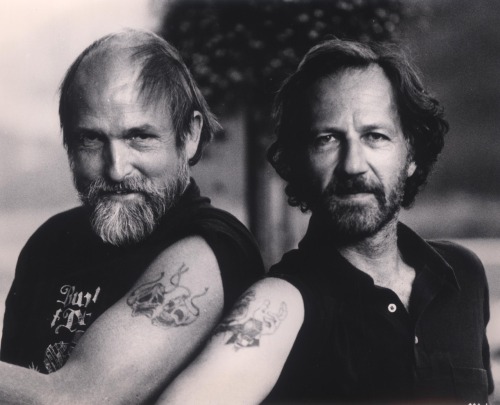As far as documentarians go, no one in the field captured the finer things in life, namely good food, music, livelihood, passion, and joyousness, quite like Les Blank did. More of an anthropologist than a documentarian, Blank always seemed to know exactly how to turn his camera toward a subject and how long to leave it there. He brought an artist's eye to intimate portraits of unique subcultures and seemed more interested in capturing life than telling a story. He would just let life happen, and in capturing it, a story would be told. His films were loose and rhythmic, full of life and color, each one soaked in regional flavor. His uncanny knack for finding fascinating subjects would range from bluesmen and polka dancers to zydeco musicians and mountain fiddlers, from North Carolina Appalachia and the streets of New Orleans to tea farms in China and the jungles of Peru. All these subcultures, all these niche and fringe groups, these fierce individuals, they were lovingly captured, portrayed, and presented publicly by Blank with admiration, truth, and a real depth of feeling. In presenting their individuality there is an exploration of our commonalities. Blank's films presented realness the way few documentaries do and of a sentiment that doesn't get expressed enough these days: that life is a wonderful and joyous thing.
With that, I am deeply saddened to report that yesterday, on April 7th, Les Blank died at his home in Berkley, California. He was 77. Bladder cancer.
One of Les Blank's first films was about Dizzy Gillespie and his 1969 short film about Texas bluesman Lightnin' Hopkins, The Blues Accordin' to Lightnin' Hopkins, would gain good notices and help launch his career in a steady direction. Blank would document Mexican music (Chulas Fronteras [1976]), the spirit of New Orleans (Always for Pleasure [1978]), legendary fiddler Tommy Jarrel (When Pigs Fly [1983]), polka dancers (In Heaven, There is No Beer? [1984]), and cajun/zydeco music (J'ai été au bal [1989]). Food and drink, the preparation and the enjoyment of, usually plays an important part in his films, when they aren't the subjects themselves, like in Garlic is as Good as Ten Mothers (1980), Yum, Yum, Yum!-A Taste of Cajun and Creole Cooking (1990), and All in This Tea (2007).
Les Blank's most famous film would be Burden of Dreams (1982), the fascinating and intimate look at the making of Werner Herzog's epic Fitzcarraldo (1982) deep in the jungles of South America. It's probably the closest and most personal look at Herzog as man and myth, while also documenting his volatile working relationship with actor Klaus Kinski. Blank would meet Herzog while filming Werner Herzog Eats His Shoe (1980), which is what the title says it is, the result of a lost bet by Herzog against documentarian Errol Morris. Blank's work with Herzog would go a long way in defining Herzog's public persona as an obsessive auteur and an uncompromising spirit.
At the time of his death, Les Blank had (at least) two films unfinished, one about Alabama folk artist Butch Anthony and the other about fellow documentarian Richard Leacock. His son Harrod Blank is quoted in the San Francisco Chronicle as saying that the films "just need to be edited." Hopefully they'll see release. I was fortunate enough to see parts of these works in progress at the 2011 Olympia Film Festival, where Les Blank was a special guest for two days worth of screenings (along with editor/collaborator Maureen Gosling). If completed, they would be excellent additions to his filmography; the piece on Anthony was fantastic.
Les Blank was a truly talented filmmaker and artist, a very humble and quiet man, and despite his body of work not having wide recognition, he deserves to be considered a national treasure. I can't imagine that time won't prove to be kind to Mr. Blank and his works.
I am reminded of a quote from Russian filmmaker Andrey Tarkovsky: "Cinema lives in time. But when time lives in the image, it becomes cinematic." Tarkovsky was speaking in regards to the process of making narrative films, but I think Les Blank has applied the same thought rationale to documentarian filmmaking. He allows his subjects to simply be, and in being, they are captured cinematically.
If by chance you've not seen any of Les Blank's films, I highly recommend that you do. My favorites are Garlic is as Good as Ten Mothers, The Blues Accordin' to Lightnin' Hopkins, J'ai été au bal, and of course, Burden of Dreams.
Rest in Peace, Les. I'm sure in heaven right now there is plenty of good food and dancing, even if there is no beer.
If you want, visit Les Blank's website to learn more and check out some products.






No comments:
Post a Comment